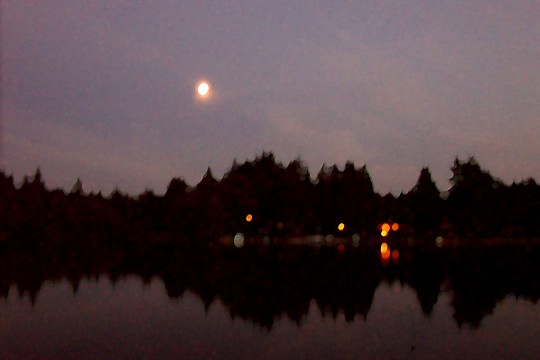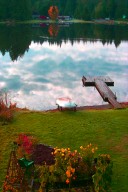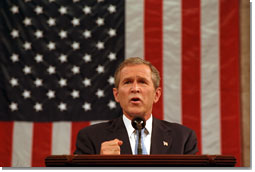Life at the Lake
a diary of living at a small lowland lakeWHAT IT'S LIKE

Early moonrise over Lake Ketchum
|
Archive Search |
| Links |
|
and s-integrator |

Back to the lake, which continues its quiet existence, no matter what side trips this blog may take. For the lake is eternal, or as nearly so as anything I can imagine.
On Wednesday we (lake and I) were interviewed by Reporter Jennifer Langston of the Seattle PI for an article she intends to write on the county's lake monitoring program. The county is mandated by the EPA to monitor and report to the federal government its efforts to improve water quality throughout the county and state, Washington.
I am part of that program, as are a number of other monitors living on lakes. My data is recorded semi-monthly throughout the summer, published online, and reported to the feds. The county has determined the best way to do this extensive chore is to train a cadre of monitors.
The basic measurements are fairly simple—air and water temperature, clarity (measured with a Sechhi disc lowered till it disappears), algal scum and algae suspended in the water column, water plants, rainfall and cloud cover, ducks and geese, and water color.
A few of us who have done these measurements for a few years have additional responsibilities of a more complex nature. These include phosphorous samples at 1 and 5 meters, chlorophyll samples at the surface, and dissolved oxygen readings at the surface, one meter, three meters, and just off the bottom, which in the instance of this lake is about five meters. Some of these have to be preserved chemically and refrigerated until they are picked up and driven to a lab.
It is fairly time-consuming, complex, and precise. So I went through a basic sampling exercise while Jennifer interviewed me and photographer Gilbert Aries snapped pictures with his Canon digital camera. Nice guy, he is a bass and steelhead fisher.
I found myself talking enthusiastically about the monitoring program and the features of the lake, including its fishing, which has perked up a little, even though the water is, well, hot. The trout have begun to hit reluctantly again, but the bass seem to have gone elsewhere, which of course is impossible.
Several other lake monitors will be interviewed by Jennifer and have their pictures snapped by Gilbert before she settles down to write her news story. This will include the woman who monitors Lake Rossiger, a huge body of water forty miles away with characteristics much unlike mine. I don't remember her name, but see her each year at our annual meeting and pizza feed in Everett, or some host lake.
She is knowledgeable and garrulous, and between the two or more of us monitors Jennifer should have a good story about the program. I've read her stuff before, and she is a thorough and dedicated reporter.
- - Comments ()
...

The New Yorker—today the city, tomorrow the world!
Whatever happened to the short story?
Now early September, I've just gotten round to reading The New Yorker's summer fiction issue. (June 16 and 23.)
This year's issue is passing curious. None of it is "short" and much of it isn't fiction, but memoir or reminiscence (usually of childhood) that sometimes makes use of fictional techniques (e.g.. conversations using quote marks). And one entry by Staffer Roger Angell (of baseball writing fame) is . . . poetry.
Well, I guess poetry is a kind of fiction. Though poets like to think of it as The Truth.
Three entries are classified as "debut fiction." All might be called reminiscence, though I am aware that good fiction told in the first-person often masquerades as non-fiction, or "truth." But most of it reads distressingly like drawn directly from personal life and thinly disguised.
I am well aware of Richard Ford's stern warning to critics and literary biographers to—beware—don't try to force a cookie mold over short stories that seem to personal accounts. They are not. They are art, fiction. And he pointed to interviewers of Raymond Carver as falsely trying to document their theses. I recall Poet Richard Hugo doing the same.
Point well taken.
All the same, the short story today (Esquire may be an exception) is not short and does not read like fiction. This may be a blessing in transparent disguise, or it may be a bad, bad sign.
I like stories that begin, "Once upon a time. . . ." which indicates they are largely lies. I like Nabokov, who keeps telling you, "Hey, look, this is a story," and often steps back and reflects as writer on what the fictionteer has written, ironically, mockingly.
The element of story is critical. Fiction (the short story) ought to read like fiction and not pretend it is something else. Like history.
Four stories are by established fiction writers, but not necessarily those whom you might expect from weekly readings of the magazine: David Sedaris, Jonathan Franzen, Roger Angell, and Jhumpa Lahiri. All are long, giving credence to the notion that there is a place, after all, for the very long short story or novella.
I liked Lahiri best of the four. And one is a poem, which kind of rules it out of consideration.
The Debut Fiction entries are seemingly better. Two of the three have an international setting, as does Lahiri, making fifty percent of the published shorts non-American in nature. Interesting. The New Yorker, then, by inference, an international publication, though most of the time centering its area of intense interest in the city itself. Gotham.
In all four selections, the American entries seem weakest. That can be taken as a plus or a minus for the magazine's editorial staff. That staff, not incidentally, includes one contributor—the writer of the poem. It tends to be cutesy and insignificant.
Sorry, Rog.
- - Comments ()
...

Just a blackberry cluster, eh?
More likely a Proustian teacake to jog one's past
Ah, the persistence of memory! An image may fade, but it never quite goes away; it lies in wait for a trigger to set it off.
Out for a walk yesterday where the blackberries are thick and ripe, I saw where a heavy shoe had trod one or more berries into the pavement. A purple stain spread out and shone dully.
Suddenly I was back in Chicago, in the time of my boyhood. It was the Thirties, and the city was not known for its gentle ways. I lived on the South Side, an area that is almost totally black today. Then it was a mixed neighborhood, mostly white but made up of many ethnic groups. I remember Germans and Poles especially. And of course the Irish.
I was five or six. It was the time of the National Depression. My mother took me for a walk. We lived on Essex, but our stroll took us over to Yates, one block away. There had been a mugging the previous day, one of many, and it had been reported in The Tribune. I have no particulars, and have to guess whether the person was robbed and injured or robbed and killed. A woman, I think.
My mother pointed out to me where it had taken place. A tattletale stain marked the ground. Blood. Dried, it still looked like blood. It did not look like the crushed blackberries that had brought back the memory. But it looked enough alike to act as a trigger to what lay buried.
I was a child again, for one cold moment, and a light tremor passed down my frame before I became an adult again, old, able to brush away the ancient image and continue to function as a man.
- - Comments ()
...
Even the dogs are eating berries, these days, as summer fades and the hot weather presses on. It's been three months without measurable rain, and fifty-some days when the temperature exceeds 70 degrees.
"Quit your bragging," says someone in the Mid-West. But this is the Far West, where wide-spread rumor has it, it rains all the time.
Here at the lake, berries proliferate and fall, over-ripe, from the tangled vines. I refer specifically to the Himalayan blackberry, but the rule holds true for the garden's ever-bearing (is there such a thing?) strawberries and raspberries, which are into phase two of their bearing.
The Himalayan blackberry is vastly over-rated—watery, full of seeds, relatively tasteless. Yet it is widely coveted and one sees entire families gathered along the shoulder wherever the berries lie heavily clustered in unnavigable patches. My two Black Labs will eat all and any of the prevailing berries.
A girl friend and I used to pick them, and she would add tapioca for thickening, lots of sugar, and bake them into a pie, which I would eat with vanilla ice cream on top. My later suggestion is to do away with the pie and just eat the ice cream.
Now, with the tiny wild blackberries that are so hard to find and pick, it is a much different matter. They are sweet and luscious, need no thickening, and the seeds are tiny. Great with ice cream, they make a fine topping to a breakfast cereal, as well.
- - Comments ()
...

"The Garden at Les Lauves," by Paul Cézanne, 1906
You're kidding, aren't you? Cézanne never painted anything so abstract as that. 'Fraid so. He did, near the end of his life. Wonderful, isn't it?
A year earlier, he wrote to a friend, "Now, being old, nearly seventy years, the sensations of color, which give the light, are for me the reasons for the abstractions which do not allow me to cover my canvas entirely nor to pursue the elimination of the objects where their points of contact are fine and delicate; from this it results that my image or picture is incomplete.
"On the other hand, the planes fall one on top of the other from whence neo-impressionism emerged, which circumscribes the contours with a black line, a fault which must be fought at all costs. But nature, if consulted, gives us the meaning attaining this end." (Cachin, Cézanne, Abrams, p. 484)
Amen.
- - Comments ()
...

Watch closely. The smile is starting its warm up
On this Labor Day, we salute our President, George Bush, a champion of labor and the American worker. High employment, a decent minimum wage, strengthening unions. Who has done more, I ask, to further his cause? (The cause, I mean, of the worker, not George Bush.)
I could count the ways, but I won't. Rather I would state what I like most about him, Our President. Duly elected (by the Supreme Court), and quick to put down disobedience in, first, Afghanistan, then Iraq, and to show them that they are not, indeed, sovereign nations practicing self-determination, what I like most about the President is . . . .
His Smile.
It is a winning Smile, practiced often, tellingly. Starting out his Presidency, the Smile was often tentative, insincere-seeming. But time has bettered it. It is absolutely convincing. Who could doubt the man's genuineness?
It is instructive to watch the Smile form on our President's face. The use of the mirror has helped him improve it. Much practice is necessary to accomplish a Smile such as his. It can be likened to a baseball pitcher (he once was part owner of the Texas Rangers, you know) winding up for a fast ball, but completely different.
First he goes into his Smile Warmup. This is accomplished by a slight narrowing of the eyes, a tip of the head (to the right, of course), the eyes lifting, widening, watering slightly (or so it would seem). Then the Smile begins to break upon us—or should I say, over us?
The Smile widens by sincere degrees. It is heart-warming to watch. Soon the President's face is beaming, as if to say, "What I am about to tell you cannot be doubted." It is the smile one uses to disarm a child who has been disobedient or been bad.
It is a Smile that will be followed by an explanation, an explanation to a child who cannot grasp the complexity of the issues involved in the situation and needs to have them simplified, at the risk of over-simplification. The Smile is to help and move along the process of assimilation of a Difficult Idea or Concept.
One speaks in such a manner to a child whom one loves, but loves in a manner necessarily condescending. "Poor thing," the Smile seems to say. "It is best to leave such decisions to adults, your leaders. Go out and play.
"I'll join you soon."
- - Comments ()
...

Here's a good buy at a local chain store. Two twelve-inch rulers, one small (for close spaces), the other full sized. Both for a buck. Want only one? It's 99 cents.
Seriously now, folks, we come to Li Po, the great Chinese poet, 701-762 A.D. (Name is pronounced Lee-Poh.) He celebrated licentiousness—drunkenness in particular. Nothing he liked more than getting soused in the evening and writing some serious poetry. (Perhaps this started the long tradition, brought to fruition in America in the mid-50s.)
He had a sense of humor, too. When hearing himself described as a "retired hermit," he was said to burst out laughing, nodding his head affirmatively.
Most of his poems are quite long and thoughtful. Here is one that is not:
"FOR HIS WIFE
Three-sixty days with a muddled sot,
That is Mistress Li Po's lot:
In what way different from the life
Of the Grand Permanent's wife?"
Nice, huh? But it's not representative.
I wish he had written some haiku. I guess it hadn't been invented yet.
- - Comments ()
...